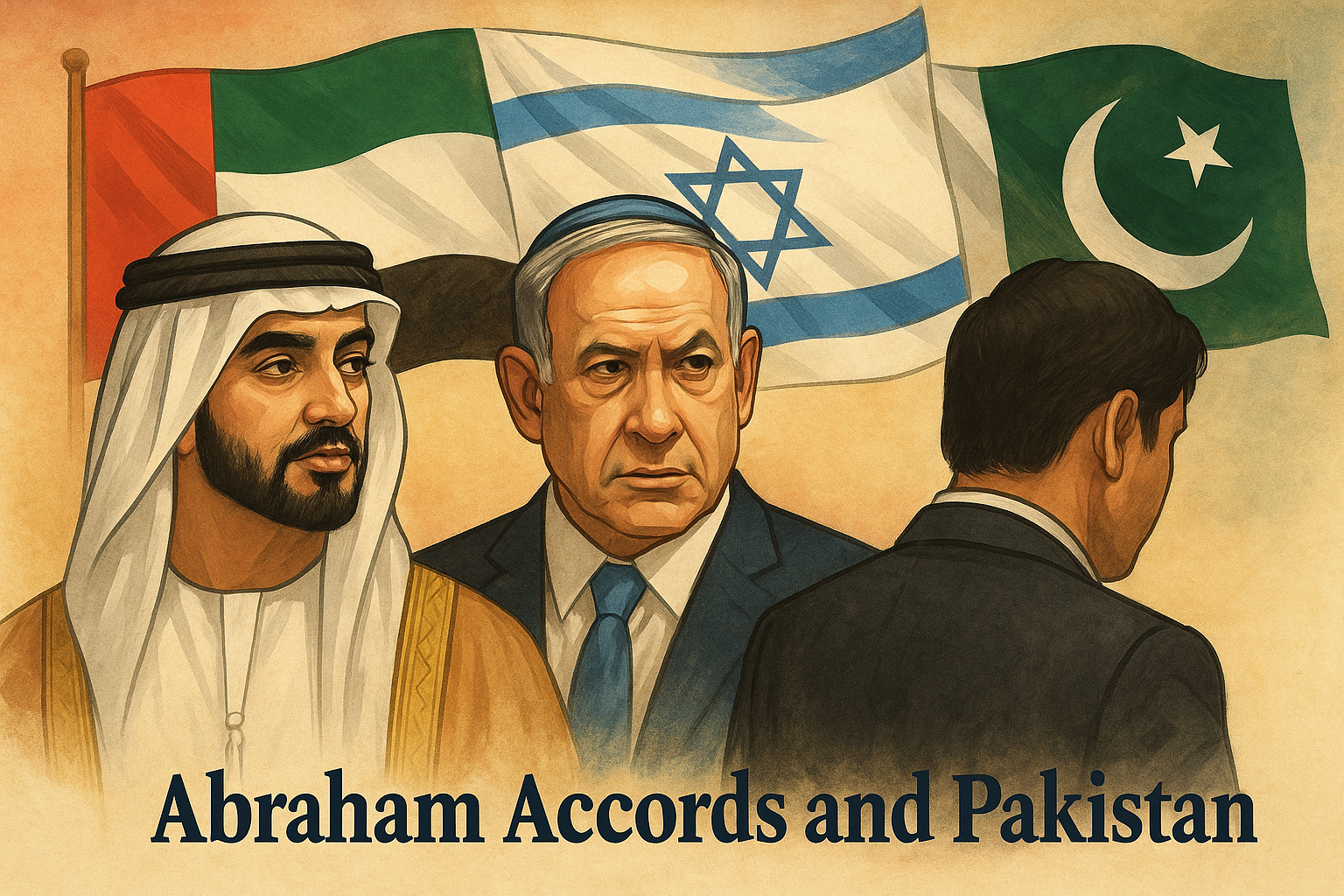Muhammad Attaullah Khan
INTRODUCTION:
The Abraham Accords are a series of agreements to normalize relations between Israel and several Arab states. The name of the accords was given in reference to the supposed common ancestor of the Jews and the Arabs, the biblical Abraham, as an expression of brotherhood. The accords, all of which were signed in the latter half of 2020, consist of a general declaration alongside bilateral agreements between Israel and the United Arab Emirates, Bahrain, and Morocco. Sudan also signed the general declaration in 2021, but ongoing instability within Sudan has delayed its ability to formalize a bilateral agreement with Israel.
Efforts have been underway since the initial signing of the Abraham Accords to normalize relations between Israel and Saudi Arabia, but the Israel-Hamas War that began in October 2023 led Saudi Arabia to insist on first creating a viable path to an independent Palestinian state. Talks began in 2025 for Syria to join the Abraham Accords after Ahmed al-Sharaa and his forces toppled the regime of Bashar al-Assad in December 2024.
CURRENT SCENARIO:
Presently, the US is on the move to bring more Arab-Muslim countries into its diplomatic fold and strategic hold by getting them to join the Abraham Accords. To that end, it is likely to bring more Gulf Arab states, especially KSA, under unrelenting pressure. Multidimensional coercion—especially encouraging democratic forces within Arab monarchies—are real possibilities and threats likely to compel these monarchies to move ahead with reluctant acceptance of these Accords. The US-Israel combine, on the other hand, has already picked up Arab-Muslim states one by one as mentioned above—namely the UAE, Bahrain, Morocco, and Sudan.
POLITICAL SPACE FOR ISRAEL:
How did the Abraham Accords provide diplomatic and political space to Israel? And why did those opposing wider diplomatic recognition of the Jewish state decide to prevent its extension? It is argued that if Hamas had not launched the ferocious attacks on October 7, 2023, some Muslim countries were on the verge of granting recognition to the Jewish state.
The first Arab state to grant recognition to Israel was Egypt under the Camp David Accords of 1978 and the Egypt-Israel peace treaty of 1979. In 1994, Jordan granted recognition to Israel. Prior to that, on September 13, 1993, the PLO and Israel signed the historic Oslo Accords, which paved the way for their mutual recognition.
Had the Oslo process reached its logical conclusion by establishing an independent Palestinian state with East Jerusalem as its capital, Israel would have been recognised by an overwhelming majority of Muslim countries. But the manner in which the Oslo process was sabotaged by the Benjamin Netanyahu regime, a viable two-state solution—also advocated by the US—reached an impasse.
PAKISTAN & ABRAHAM ACCORDS:
In principle, the Islamic Republic of Pakistan is willing to recognize Israel if the two-state agreement is implemented in letter and spirit. Our battered Palestinian brothers have already agreed to the Vienna understanding. The dissenting states (Iraq, Syria) have already been pummelled into submission.
Pakistan has recently clarified its position on this issue. On June 27, 2025, while speaking at a news conference at the Foreign Office, Mr. Ishaq Dar—who also serves as Deputy Prime Minister—reiterated Pakistan’s firm support for a two-state solution to the Israeli-Palestinian conflict.
His comments came in response to recent remarks by US Special Envoy for the Middle East Mr. Steve Witkoff, who suggested that more countries, which were not previously “contemplated,” were preparing to join the US-brokered Accords, which normalize ties with Israel.
However, there is a widespread move by the US and its allies, including the UK, to bring Saudi Arabia into the club of those countries that have already joined these Accords. The US administration is also believed to be busy in bringing KSA and Pakistan together to sign the Abraham Accords.
Meanwhile, the EU is separately working on a negotiated settlement of Iran’s nuclear program with the prospect of granting partial relief in economic sanctions, provided that Iran softens its stance on the Abraham Accords.
While Israel has been busy with the total elimination of Hamas, the US has prevailed upon Mahmoud Abbas, President of the West Bank Authority and successor of PLO Chairman Yasser Arafat, to work on modalities to help grant wider acceptability to the Abraham Accords among the Palestinian populace.
In case all Arabs—including representatives of the Palestinians and KSA—sign the Abraham Accords, Pakistan will be left with very limited options to take the other course.
WAY FORWARD:
a. The Government of Pakistan shall convene an All-Party Conference to discuss the situation in the Middle East, particularly the Abraham Accords and multiple options available to Pakistan.
b. The Parliament shall also discuss various scenarios in this context—i.e., if KSA and the Palestinians sign the Abraham Accords, what will be our position? And if they sign but Iran once again takes the opposite direction, then what will be the best course of action available to Pakistan?
c. Meanwhile, Pakistan shall also call a meeting of OIC member states in order to adopt a joint strategy on this issue, as people in Pakistan are perplexed and are demanding that the government come out with a clear policy direction in this regard.
The author is former Joint Director General, Intelligence Bureau and geo-political analyst.




